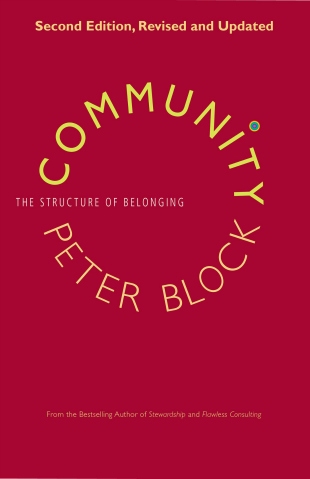Questions with Little Power
"The existing conversation is organized around a set of traditional questions that have little power to create an alternative future. These are the questions the world is constantly asking. It is understandable that we ask them, but they carry no power; and in the asking, each of these questions is an obstacle to addressing what has given rise to the question in the first place:
"How do we get people to show up and be committed?
How do we get others to be more responsible?
How do we get people to come on board and to do the right thing?
How do we hold those people accountable?
How do we get others to buy in to our vision?
How do we get those people to change?
How much will it cost and where do we get the money?
How do we negotiate for something better?
What new policy or legislation will move our interests forward?
Where is it working? Who has solved this elsewhere and how do we import that knowledge?
How do we find and develop better leaders?
Why aren't those people in the room?
"If we answer these questions directly, from the context from which they are asked, we are supporting the mindset that an alternative future can be negotiated, mandated, engineered, and controlled into existence. They call us to try harder at what we have been doing.
"The hidden agenda in these questions is to maintain dominance and to be right. They urge us to raise standards, measure more closely, and return to basics, purportedly to create accountability. They are not really about returning to basics, they are about returning to what got us here. These questions have no power; they only carry force.
"All these questions preserve innocence for the one asking. They imply that the one asking knows, and other people are a problem to be solved. These are each an expression of reliance on the use of force to make a difference in the world. They occur when we lose faith in our own power and the power of our community.
"Questions that are designed to change other people are the wrong questions. Wrong, not because they don't matter or are based on ill intent, but wrong because they reinforce the problem-solving model. They are questions that are the cause of the very thing we are trying to shift: the fragmented and retributive nature of our communities. The conversations about standards, measures, and the change needed in others destroy relatedness, and it is in this way that they work against belonging and community.
"These questions are also a response to the wish to create a predictable future. We want desperately to take uncertainty out of the future. But when we take uncertainty out, it is no longer the future. It is the present projected forward. Nothing new can come from the desire for a predictable tomorrow. The only way to make tomorrow predictable is to make it just like today. In fact, what distinguishes the future is its unpredictability and mystery.
Questions with Great Power
"Questions that have the power to make a difference are ones that engage people in an intimate way, confront them with their freedom, and invite them to cocreate a future possibility.
"Achieving accountability and commitment entails the use of questions through which, in the act of answering them, we become cocreators of the world. It does not matter what our answers to the questions are. The questions have an impact even if the response is to refuse to answer them. To state it more dramatically: Powerful questions are the ones that cause you to become an actor as soon as you answer them. You no longer have the luxury of being a spectator of whatever it is you are concerned about. Regardless of how you answer these questions, you are guilty, Guilty of having created this world. Not a pleasant thought, but the moment we accept the idea that we have created the world, we have the power to change it.
"Powerful questions also express the reality that change, like life, is difficult and unpredictable. They open up the conversation — in contrast to questions that are, in a sense, answers in disguise. Answers in disguise narrow and control the dialogue, and thereby the future.
"We can generalize what qualities define great questions, and this gives us the capacity not just to remember a list but also to create powerful questions of our own.
"A great question has three qualities:
"It is ambiguous. There is no attempt to try to precisely define what is meant by the question. This requires each person to bring their own, personal meaning into the room.
"It is personal. All passion, commitment, and connection grow out of what is most personal. We need to create space for the personal.
"It evokes anxiety. All that matters makes us anxious. It is our wish to escape from anxiety that steals our aliveness. If there is no edge to the question, there is no power.
"Questions themselves are an art form worthy of a lifetime of study. They are what transform the hour. Here are some questions that have the capacity to open the space for a different future:
"What is the commitment you hold that brought you into this room?
What is the price you or others pay for being here today?
How valuable do you plan for this effort to be?
What is the crossroads you face at this stage of the game?
What is the story you keep telling about the problems of this community?
What are the gifts you hold that have not been brought fully into the world?
What is your contribution to the very thing you complain about?
What is it about you or your team, group, or neighborhood that no one knows?"
